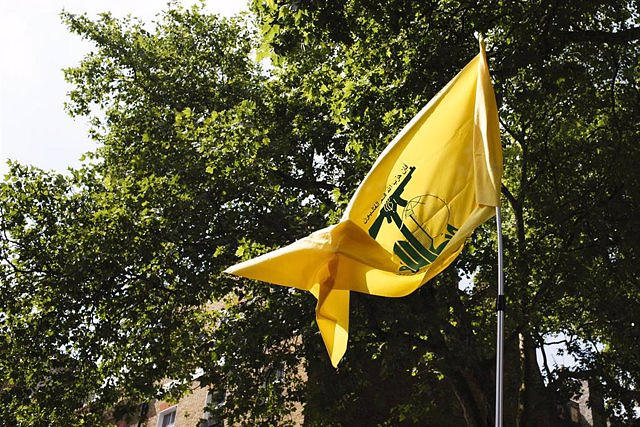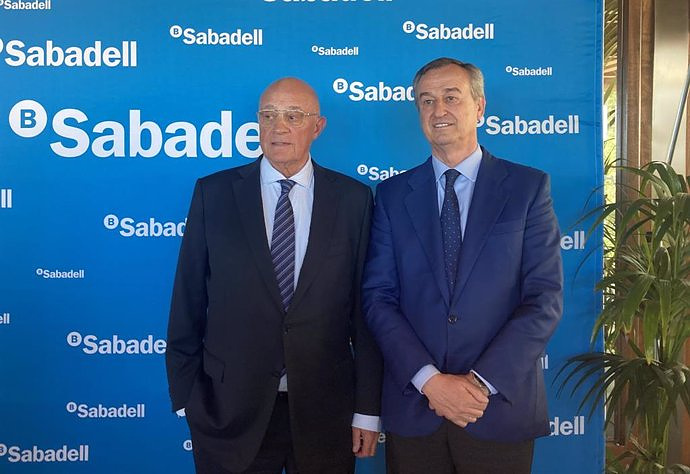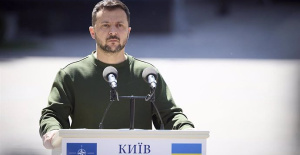A direct involvement of Hezbollah would give another dimension to the conflict and threaten its regional expansion or a clash between Israel and Iran.
MADRID, 23 Oct. (EUROPA PRESS) -
The open war in the Middle East following the attacks carried out on October 7 by the Islamic Resistance Movement (Hamas) against Israel, which left nearly 1,400 dead, runs the risk of expanding in the face of the latest clashes on the border with Lebanon. from where the Shiite militia party Hezbollah could join the fight and open a second front against the Israeli Army.
Hezbollah, backed by Iran and considered one of the largest paramilitary forces in the Middle East, has been involved in exchanges of fire in recent weeks, in the most serious incidents since the 2006 asymmetric war, which has raised alarm bells in the region, especially given Tehran's potential role in the war.
The group, whose name means 'Party of God', emerged in 1982 in the context of the war between Lebanon and Israel - which broke out in the middle of the Lebanese Civil War (1975-1990) - at the hands of a group of clerics. Shiites who had studied in Iraq and who were betting on following the policies of the leader of the Islamic Revolution of Iran, Ayatollah Ruhollah Khomeini.
Hezbollah currently controls parts of southern and eastern Lebanon, as well as part of the suburbs of Beirut, and has the support of Iran's Revolutionary Guard, which provided advisors and military aid to consolidate the formation as one of the main elements in the country with the aim of defeating Israel, Tehran's declared enemy after the Islamic Revolution.
The Israeli invasion in 1982, in which Israeli troops took over almost half of the territory with the support of Lebanese Christian militias, allowed Hezbollah to reinforce its role as a resistance group, which made it gain important support and legitimacy. among part of the population. After the end of the Lebanese Civil War, the group entered politics through its political arm - currently represented in Parliament by the Loyalty to the Resistance bloc -, becoming part of several governments.
The group has not been without controversy, especially over the activities of its armed wing -- the Jihad Council -- including its role in the assassination of former Prime Minister Rafik Hariri and 21 others in a bomb attack in February 2005 in Beirut. Likewise, he has been harshly criticized for his role in various regional conflicts, especially as a result of his participation in the war that broke out in 2011 in Syria, where he fights on the side of the forces of the Syrian president, Bashar al Assad, backed by Tehran.
The main criticism at this point stems from the fact that its detractors consider that these activities carry the risk of dragging the country into an open conflict with Israel or the United States, especially since they represent a violation of Beirut's policy of non-interference in regional affairs. , a situation especially present in the current context.
Hezbollah has evolved into an important paramilitary force, a fact that has become especially evident because it was the only group that did not disarm as a result of the Taif Agreement of 1989. Thus, it maintains that, although the text states " the dissolution of all militias" and "the restoration of state jurisdiction" throughout the territory, also includes a reference to the "implementation of all necessary measures to liberate Lebanese territory from Israeli occupation" as an argument for maintaining its arsenal .
This fact has caused a manifest imbalance in the internal balance of power, since it gives an advantage to Hezbollah due to its military power - without the Government or the Army having attempted disarmament by force in the face of the threat of conflict -, without the dialogue processes promoted in 2006 and 2012 to try to reach a solution bearing fruit because the party-militia maintains that the Israeli threat is still present.
Furthermore, it must be taken into account that Hezbollah's involvement in the war in Syria - which the group justified as an effort to repel the threat of expansion into Lebanon by Salafist and jihadist groups, including the Islamic State - has allowed the group improve their military capabilities and refine combat techniques in the neighboring country.
In this context, the leader of Hezbollah, Hasan Nasrallah - who has headed the group since 1992, after the death of the then leader and co-founder of Hezbollah Abbas al Moussawi - went so far as to state in 2021 that the group has nearly 100,000 combatants, while the Israeli Army also maintains that Hezbollah "is one of the most active and dangerous terrorist organizations in the world" and affirms that it is a "quasi-military" organization.
Thus, the Israeli think tank The Institute for National Security Studies estimates that the group has "between 150,000 and 200,000 rockets, mortar projectiles and missiles", including "thousands of high precision", as well as about 4,000 Grad and "a limited number" of Scud missiles. In addition, it has "C802 surface-to-air missiles, made in China" and drones with the capacity to attack at distances of up to 400 kilometers.
Recent months have seen an uptick in security incidents and exchanges of accusations between Israel and Hezbollah, with Israel denouncing in June the installation of two tents by Hezbollah in which there would be armed people in the Farms of Shebaa, occupied by Israel during the Six-Day War in 1967.
After the Hamas attacks, Nasrallah himself "congratulated" the "heroic fighters of the Palestinian factions" and described the offensive as "a triumphant operation" and a "decisive response to the crimes of the occupation," while calling on Israel to "learn the important lessons given by the Palestinian resistance." Thus, he said the group was "closely monitoring" developments and maintaining contact with Hamas, without openly announcing involvement in the war.
Therefore, the opening of a new front on the border between Israel and Lebanon - patrolled by the United Nations Interim Force for Lebanon (UNIFIL), where Spanish troops are deployed - could expand the conflict to the rest of the region, including the opening of another front in the Golan Heights, which connects with Syria and from there with the armed groups allied with Iran in Iraq or Yemen, in addition to the Iranian forces themselves.
In this sense, the Iranian Foreign Minister, Hosein Amirabdolahian, indicated on October 14 that Tehran leaves any "expansion of the front" in the hands of Hezbollah, although in recent days it has hardened its tone towards Israel due to the intensity of the conflicts. bombings against the Gaza Strip, which have already left nearly 4,700 Palestinians dead and around 13,000 injured.
Iran's possible involvement in an open war would give a totally different dimension to the conflict due to the military potential of both countries -- including nuclear weapons in Israel's possession -- and the possibility that Israel's and Iran's allies -- among whom The United States and Russia stand out, respectively, supporting their partners, which has even been seen as triggering a third world war.
For this reason, the Lebanese Government - in office for more than a year due to internal differences, which have also prevented the election of a president since October 2022 - has harshly criticized Israel for its response to Hamas attacks, if They have appealed to keep the country away from a conflict that could be disastrous for Lebanon, already mired in an enormous economic crisis deepened by the aforementioned political paralysis.

 Exploring Cardano: Inner Workings and Advantages of this Cryptocurrency
Exploring Cardano: Inner Workings and Advantages of this Cryptocurrency Seville.- Economy.- Innova.- STSA inaugurates its new painting and sealing hangar in San Pablo, for 18 million
Seville.- Economy.- Innova.- STSA inaugurates its new painting and sealing hangar in San Pablo, for 18 million Innova.- More than 300 volunteers join the Andalucía Compromiso Digital network in one month to facilitate access to ICT
Innova.- More than 300 volunteers join the Andalucía Compromiso Digital network in one month to facilitate access to ICT Innova.-AMP.- Ayesa acquires 51% of Sadiel, which will create new technological engineering products and expand markets
Innova.-AMP.- Ayesa acquires 51% of Sadiel, which will create new technological engineering products and expand markets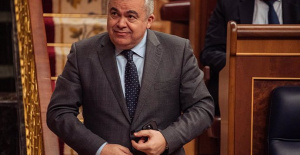 Cerdán censures the "dirty war" of the right and calls for a debate around "democratic regeneration"
Cerdán censures the "dirty war" of the right and calls for a debate around "democratic regeneration"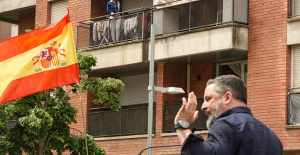 12M.- Abascal (Vox) proposes "massive deportations" in the face of illegal immigration
12M.- Abascal (Vox) proposes "massive deportations" in the face of illegal immigration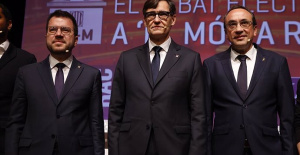 The campaign reaches the halfway mark marked by Sánchez's reflection and with Illa first in polls
The campaign reaches the halfway mark marked by Sánchez's reflection and with Illa first in polls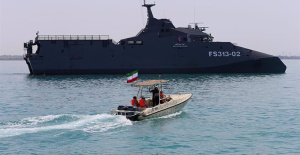 Iran sends 'Shahid Mahdawi' beyond the equator in first long-distance mission by a warship
Iran sends 'Shahid Mahdawi' beyond the equator in first long-distance mission by a warship How Blockchain in being used to shape the future
How Blockchain in being used to shape the future Not just BTC and ETH: Here Are Some More Interesting Coins Worth Focusing on
Not just BTC and ETH: Here Are Some More Interesting Coins Worth Focusing on A sensor system obtains the fingerprint of essential oils and detects if they have been adulterated
A sensor system obtains the fingerprint of essential oils and detects if they have been adulterated Faraday UPV presents the 'Origin' rocket to exceed 10 km of flight: "It is the beginning of the journey to space"
Faraday UPV presents the 'Origin' rocket to exceed 10 km of flight: "It is the beginning of the journey to space" The Generalitat calls for aid worth 4 million to promote innovation projects in municipalities
The Generalitat calls for aid worth 4 million to promote innovation projects in municipalities UPV students design an app that helps improve the ventilation of homes in the face of high temperatures
UPV students design an app that helps improve the ventilation of homes in the face of high temperatures A million people demonstrate in France against Macron's pension reform
A million people demonstrate in France against Macron's pension reform Russia launches several missiles against "critical infrastructure" in the city of Zaporizhia
Russia launches several missiles against "critical infrastructure" in the city of Zaporizhia A "procession" remembers the dead of the Calabria shipwreck as bodies continue to wash up on the shore
A "procession" remembers the dead of the Calabria shipwreck as bodies continue to wash up on the shore Prison sentences handed down for three prominent Hong Kong pro-democracy activists
Prison sentences handed down for three prominent Hong Kong pro-democracy activists ETH continues to leave trading platforms, Ethereum balance on exchanges lowest in 3 years
ETH continues to leave trading platforms, Ethereum balance on exchanges lowest in 3 years Investors invest $450 million in Consensys, Ethereum incubator now valued at $7 billion
Investors invest $450 million in Consensys, Ethereum incubator now valued at $7 billion Alchemy Integrates Ethereum L2 Product Starknet to Enhance Web3 Scalability at a Price 100x Lower Than L1 Fees
Alchemy Integrates Ethereum L2 Product Starknet to Enhance Web3 Scalability at a Price 100x Lower Than L1 Fees Mining Report: Bitcoin's Electricity Consumption Declines by 25% in Q1 2022
Mining Report: Bitcoin's Electricity Consumption Declines by 25% in Q1 2022 Oil-to-Bitcoin Mining Firm Crusoe Energy Systems Raised $505 Million
Oil-to-Bitcoin Mining Firm Crusoe Energy Systems Raised $505 Million Microbt reveals the latest Bitcoin mining rigs -- Machines produce up to 126 TH/s with custom 5nm chip design
Microbt reveals the latest Bitcoin mining rigs -- Machines produce up to 126 TH/s with custom 5nm chip design Bitcoin's Mining Difficulty Hits a Lifetime High, With More Than 90% of BTC Supply Issued
Bitcoin's Mining Difficulty Hits a Lifetime High, With More Than 90% of BTC Supply Issued The Biggest Movers are Near, EOS, and RUNE during Friday's Selloff
The Biggest Movers are Near, EOS, and RUNE during Friday's Selloff Global Markets Spooked by a Hawkish Fed and Covid, Stocks and Crypto Gain After Musk Buys Twitter
Global Markets Spooked by a Hawkish Fed and Covid, Stocks and Crypto Gain After Musk Buys Twitter Bitso to offset carbon emissions from the Trading Platform's ERC20, ETH, and BTC Transactions
Bitso to offset carbon emissions from the Trading Platform's ERC20, ETH, and BTC Transactions Draftkings Announces 2022 College Hoops NFT Selection for March Madness
Draftkings Announces 2022 College Hoops NFT Selection for March Madness